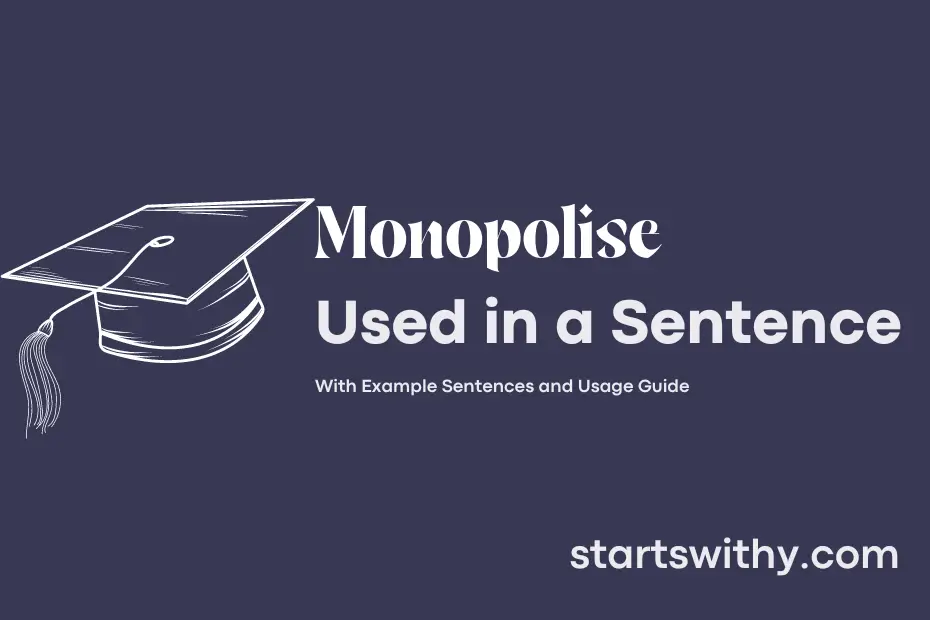Have you ever wondered what it means to monopolise? In simple terms, to monopolise is to gain exclusive control or possession of something, usually a market or industry. This can be achieved through various means such as acquiring all competitors, setting unfair prices, or controlling the distribution channels.
Businesses that monopolise a market often have the power to dictate terms and prices, limiting competition and potentially harming consumers. It is a controversial practice that has sparked debates on fair competition and antitrust regulations.
7 Examples Of Monopolise Used In a Sentence For Kids
- Monopolise means to have all the toys to yourself.
- It’s not nice to monopolise the swings at the playground.
- Let’s share the crayons so one person doesn’t monopolise them.
- We should take turns playing with the ball instead of letting one person monopolise it.
- Don’t monopolise the storybook, let others read it too.
- It’s more fun when everyone gets a chance to play and no one tries to monopolise the game.
- Remember to share and not monopolise the snacks during snack time.
14 Sentences with Monopolise Examples
- Students should avoid letting one company monopolise the job market by exploring diverse opportunities.
- It is important for college students to not let a single brand monopolise their fashion choices.
- By participating in various activities and clubs, students can prevent one group from monopolising campus culture.
- To promote healthy competition, it is essential for students to avoid letting one corporation monopolise the market.
- Students should keep their minds open to new ideas and perspectives to prevent one ideology from monopolising their thinking.
- By supporting local businesses, students can prevent large corporations from monopolising the economy.
- It is crucial for students to engage with a wide range of sources to prevent one perspective from monopolising their knowledge.
- By encouraging entrepreneurship and innovation, students can prevent any single company from monopolising a particular industry.
- Students must demand transparency and accountability from their institutions to prevent any entities from monopolising power and decision-making.
- To promote a fair and inclusive environment, students should prevent any group from monopolising student services or resources.
- By advocating for diversity and inclusion, students can prevent one group from monopolising representation and opportunities.
- It is important for students to advocate for fair practices in academia to prevent any professor from monopolising knowledge.
- Students should actively participate in discussions and debates to prevent one opinion from monopolising classroom conversations.
- By promoting healthy competition and collaboration, students can prevent any individual from monopolising success and recognition.
How To Use Monopolise in Sentences?
To use Monopolise in a sentence, you should follow these simple steps:
-
Identify the context: Before using the word Monopolise, understand its meaning. It refers to the exclusive possession or control of something. Think about a situation where one entity has complete control over a particular market or resource.
-
Choose your subject: Determine who or what is monopolizing in your sentence. It can be a company, a person, a group, or even a country.
-
Construct your sentence: Once you have the context and subject, create your sentence. For example, “The technology giant tried to monopolise the smartphone market by buying out its competitors.”
-
Check for accuracy: Ensure that the sentence accurately conveys the concept of monopolizing and that it fits well within the context you’ve identified.
-
Practice: To become more comfortable using Monopolise in a sentence, practice constructing different sentences that showcase the word in various contexts.
By following these steps and practicing regularly, you will gain confidence in using Monopolise effectively in your writing and conversations.
Conclusion
In conclusion, when one company monopolises a market, it gains control over prices, production, and consumer choices, often limiting competition and innovation. This can result in higher prices for consumers, lower quality products or services, and reduced incentives for companies to improve. Monopolies can inhibit market efficiency and hinder economic growth by thwarting fair competition and stifling diversity in the marketplace.
Governments may need to intervene through regulations or antitrust laws to prevent companies from monopolising industries and to ensure a level playing field for businesses. By promoting competition, regulators can help foster innovation, lower prices, and enhance consumer welfare in the market. It is crucial for a healthy economy to have a balance between market competition and preventing monopolistic behaviour to support innovation and growth.



